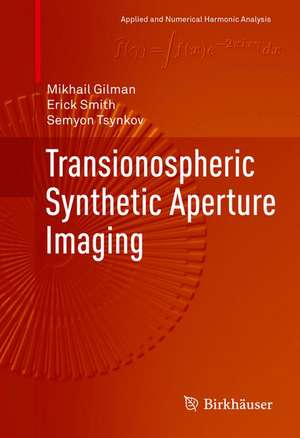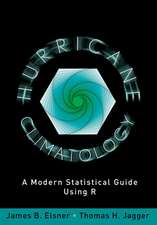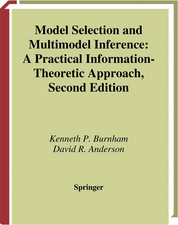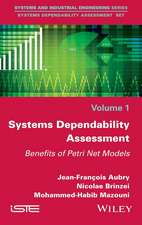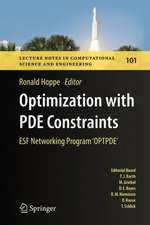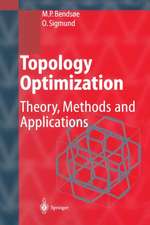Transionospheric Synthetic Aperture Imaging: Applied and Numerical Harmonic Analysis
Autor Mikhail Gilman, Erick Smith, Semyon Tsynkoven Limba Engleză Hardback – 25 apr 2017
The mathematics in this volume is clean and rigorous – no assumptions are hidden or ambiguously stated. The resulting work is truly interdisciplinary, providing both a comprehensive and thorough exposition of the field, as well as an accurate account of a range of relevant physical processes and phenomena.
The book is intended for applied mathematicians interested in the area of radar imaging or, more generally, remote sensing, as well as physicists and electrical/electronic engineers who develop/operate spaceborne SAR sensors and perform the data processing. The methods in the book are also useful for researchers and practitioners working on other types of imaging. Moreover, the book is accessible to graduate students in applied mathematics, physics, engineering, and related disciplines.
Praise for Transionospheric Synthetic Aperture Imaging:
“I perceive that this text will mark a turning point in the field of synthetic aperture radar research and practice. I believe this text will instigate a new era of more rigorous image formation relieving the research, development and practitioner communities of inconsistent physical assumptions and numerical approaches.” – Richard Albanese, Senior Scientist, Albanese Defense and Energy Development LLC
| Toate formatele și edițiile | Preț | Express |
|---|---|---|
| Paperback (1) | 735.53 lei 6-8 săpt. | |
| Springer International Publishing – 18 iul 2018 | 735.53 lei 6-8 săpt. | |
| Hardback (1) | 741.68 lei 6-8 săpt. | |
| Springer International Publishing – 25 apr 2017 | 741.68 lei 6-8 săpt. |
Din seria Applied and Numerical Harmonic Analysis
-
 Preț: 399.29 lei
Preț: 399.29 lei - 20%
 Preț: 673.02 lei
Preț: 673.02 lei - 17%
 Preț: 431.76 lei
Preț: 431.76 lei - 19%
 Preț: 443.08 lei
Preț: 443.08 lei -
 Preț: 412.57 lei
Preț: 412.57 lei - 15%
 Preț: 550.04 lei
Preț: 550.04 lei - 15%
 Preț: 653.98 lei
Preț: 653.98 lei - 18%
 Preț: 1014.28 lei
Preț: 1014.28 lei - 15%
 Preț: 647.92 lei
Preț: 647.92 lei -
 Preț: 413.37 lei
Preț: 413.37 lei - 15%
 Preț: 648.74 lei
Preț: 648.74 lei - 15%
 Preț: 654.77 lei
Preț: 654.77 lei - 15%
 Preț: 636.80 lei
Preț: 636.80 lei - 15%
 Preț: 532.89 lei
Preț: 532.89 lei - 15%
 Preț: 646.62 lei
Preț: 646.62 lei - 15%
 Preț: 653.98 lei
Preț: 653.98 lei -
 Preț: 397.38 lei
Preț: 397.38 lei - 15%
 Preț: 656.43 lei
Preț: 656.43 lei - 15%
 Preț: 661.97 lei
Preț: 661.97 lei - 18%
 Preț: 957.13 lei
Preț: 957.13 lei - 24%
 Preț: 829.71 lei
Preț: 829.71 lei -
 Preț: 398.35 lei
Preț: 398.35 lei - 20%
 Preț: 569.85 lei
Preț: 569.85 lei -
 Preț: 392.21 lei
Preț: 392.21 lei - 18%
 Preț: 1121.76 lei
Preț: 1121.76 lei - 18%
 Preț: 1001.32 lei
Preț: 1001.32 lei -
 Preț: 387.75 lei
Preț: 387.75 lei - 15%
 Preț: 653.98 lei
Preț: 653.98 lei - 20%
 Preț: 567.32 lei
Preț: 567.32 lei - 20%
 Preț: 573.76 lei
Preț: 573.76 lei -
 Preț: 406.80 lei
Preț: 406.80 lei -
 Preț: 387.38 lei
Preț: 387.38 lei - 5%
 Preț: 1168.71 lei
Preț: 1168.71 lei -
 Preț: 400.85 lei
Preț: 400.85 lei -
 Preț: 398.15 lei
Preț: 398.15 lei - 15%
 Preț: 644.49 lei
Preț: 644.49 lei - 19%
 Preț: 575.82 lei
Preț: 575.82 lei - 15%
 Preț: 703.71 lei
Preț: 703.71 lei - 20%
 Preț: 334.71 lei
Preț: 334.71 lei - 15%
 Preț: 525.54 lei
Preț: 525.54 lei -
 Preț: 405.06 lei
Preț: 405.06 lei - 15%
 Preț: 536.96 lei
Preț: 536.96 lei
Preț: 741.68 lei
Preț vechi: 904.49 lei
-18% Nou
Puncte Express: 1113
Preț estimativ în valută:
141.92€ • 148.60$ • 117.71£
141.92€ • 148.60$ • 117.71£
Carte tipărită la comandă
Livrare economică 09-23 aprilie
Preluare comenzi: 021 569.72.76
Specificații
ISBN-13: 9783319521251
ISBN-10: 331952125X
Pagini: 453
Ilustrații: XXIII, 458 p. 25 illus., 16 illus. in color.
Dimensiuni: 155 x 235 x 27 mm
Greutate: 0.85 kg
Ediția:1st ed. 2017
Editura: Springer International Publishing
Colecția Birkhäuser
Seria Applied and Numerical Harmonic Analysis
Locul publicării:Cham, Switzerland
ISBN-10: 331952125X
Pagini: 453
Ilustrații: XXIII, 458 p. 25 illus., 16 illus. in color.
Dimensiuni: 155 x 235 x 27 mm
Greutate: 0.85 kg
Ediția:1st ed. 2017
Editura: Springer International Publishing
Colecția Birkhäuser
Seria Applied and Numerical Harmonic Analysis
Locul publicării:Cham, Switzerland
Cuprins
Preface.- Introduction.- Conventional SAR imaging.- SAR imaging through the Earth's ionosphere.- The effect of ionospheric turbulence.- The effect of ionosopheric anisotropy.- The start-stop approximation.- Modeling radar targets beyond the first Born approximation.- Inverse scattering off anisotropic targets.- Discussion and outstanding questions.- List of Figures.- List of Tables.- Bibliography.- Index.
Recenzii
“The book is intended for applied mathematicians interested in SAR or, in general, remote sensing, as well as physicists and electrical/electronic engineers who develope spaceborn SAR sensors and perform the data processing. The theory from this book can also be useful for researchers working on different types of imaging. Moreover, the book is accessible to graduate students in applied mathematics, physics, engineering, and related disciplines.” (Agnieszka Lisowska, zbMATH 1375.86001, 2018)
“The monograph is an excellent reference for anyone who is interested in the mathematical theory of transionospheric synthetic aperture imaging. This book is a delightful source of elegant and powerful ideas, packed with mathematical gems and far-reaching applications. It fills a major gap in the literature and will be useful to students and practitioners alike for many years to come. We highly recommend this book.” (Alex Mahalov and Austin McDaniel, Mathematical Reviews, Decemeber, 2017)
Textul de pe ultima copertă
This landmark monograph presents the most recent mathematical developments in the analysis of ionospheric distortions of SAR images and offers innovative new strategies for their mitigation. As a prerequisite to addressing these topics, the book also discusses the radar ambiguity theory as it applies to synthetic aperture imaging and the propagation of radio waves through the ionospheric plasma, including the anisotropic and turbulent cases. In addition, it covers a host of related subjects, such as the mathematical modeling of extended radar targets (as opposed to point-wise targets) and the scattering of radio waves off those targets, as well as the theoretical analysis of the start-stop approximation, which is used routinely in SAR signal processing but often without proper justification.
The mathematics in this volume is clean and rigorous – no assumptions are hidden or ambiguously stated. The resulting work is truly interdisciplinary, providing both a comprehensive and thorough exposition of the field, as well as an accurate account of a range of relevant physical processes and phenomena.
The book is intended for applied mathematicians interested in the area of radar imaging or, more generally, remote sensing, as well as physicists and electrical/electronic engineers who develop/operate spaceborne SAR sensors and perform the data processing. The methods in the book are also useful for researchers and practitioners working on other types of imaging. Moreover, the book is accessible to graduate students in applied mathematics, physics, engineering, and related disciplines.
Praise for Transionospheric Synthetic Aperture Imaging:
“I perceive that this text will mark a turning point in the field of synthetic aperture radar research and practice. I believe this text will instigate a new era of more rigorous image formation relieving the research, development and practitionercommunities of inconsistent physical assumptions and numerical approaches.” – Richard Albanese, Senior Scientist, Albanese Defense and Energy Development LLC
The mathematics in this volume is clean and rigorous – no assumptions are hidden or ambiguously stated. The resulting work is truly interdisciplinary, providing both a comprehensive and thorough exposition of the field, as well as an accurate account of a range of relevant physical processes and phenomena.
The book is intended for applied mathematicians interested in the area of radar imaging or, more generally, remote sensing, as well as physicists and electrical/electronic engineers who develop/operate spaceborne SAR sensors and perform the data processing. The methods in the book are also useful for researchers and practitioners working on other types of imaging. Moreover, the book is accessible to graduate students in applied mathematics, physics, engineering, and related disciplines.
Praise for Transionospheric Synthetic Aperture Imaging:
“I perceive that this text will mark a turning point in the field of synthetic aperture radar research and practice. I believe this text will instigate a new era of more rigorous image formation relieving the research, development and practitionercommunities of inconsistent physical assumptions and numerical approaches.” – Richard Albanese, Senior Scientist, Albanese Defense and Energy Development LLC
Caracteristici
Rigorous mathematical treatment of SAR imaging, enabling accurate and robust quantitative estimates of the various effects Intertwines mathematical analysis with the actual underlying physics of SAR imaging Concludes each chapter with a summary that describes the key concepts and results Includes supplementary material: sn.pub/extras
